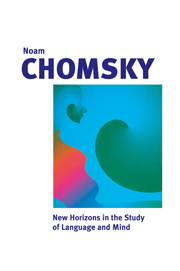Book contents
- Frontmatter
- Contents
- Foreword by Neil Smith
- Acknowledgements
- Introduction
- 1 New horizons in the study of language
- 2 Explaining language use
- 3 Language and interpretation: philosophical reflections and empirical inquiry
- 4 Naturalism and dualism in the study of language and mind
- 5 Language as a natural object
- 6 Language from an internalist perspective
- 7 Internalist explorations
- Notes
- References
- Index
3 - Language and interpretation: philosophical reflections and empirical inquiry
Published online by Cambridge University Press: 05 June 2012
- Frontmatter
- Contents
- Foreword by Neil Smith
- Acknowledgements
- Introduction
- 1 New horizons in the study of language
- 2 Explaining language use
- 3 Language and interpretation: philosophical reflections and empirical inquiry
- 4 Naturalism and dualism in the study of language and mind
- 5 Language as a natural object
- 6 Language from an internalist perspective
- 7 Internalist explorations
- Notes
- References
- Index
Summary
In the philosophical literature of the past 40 years, there have been several influential currents that seem to me problematic in important, even essential respects. I have in mind, in the first place, approaches that take as their point of departure certain conceptions of how language is studied, or should be studied, by the empirical scientist – or the “field linguist,” to use the terms of Quine's familiar paradigm. One can include here Quine, Donald Davidson, and others who have moved towards a form of pragmatism and “naturalized epistemology,” incorporating questions thought to be of philosophical significance within their conception of empirical science, but also others who adopt a different starting point: Michael Dummett, and many of those influenced by Wittgenstein and ordinary language philosophy, for example.
To illustrate the flavor of these ideas, take some comments of Richard Rorty in Lepore (1986) on Davidson. He writes that “Davidson is surely right that Quine ‘saved philosophy of language as a serious subject’ by getting rid of the analytic–synthetic distinction. Quine's best argument for doing so was that the distinction is of no use to the field linguist” (Rorty 1986: 339).
Information
- Type
- Chapter
- Information
- New Horizons in the Study of Language and Mind , pp. 46 - 74Publisher: Cambridge University PressPrint publication year: 2000
Accessibility standard: Unknown
Why this information is here
This section outlines the accessibility features of this content - including support for screen readers, full keyboard navigation and high-contrast display options. This may not be relevant for you.Accessibility Information
- 2
- Cited by
